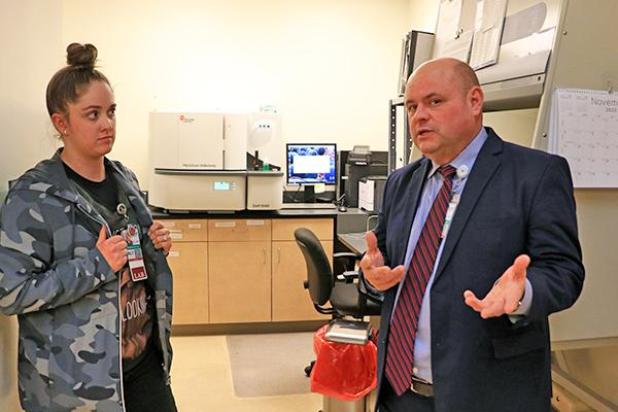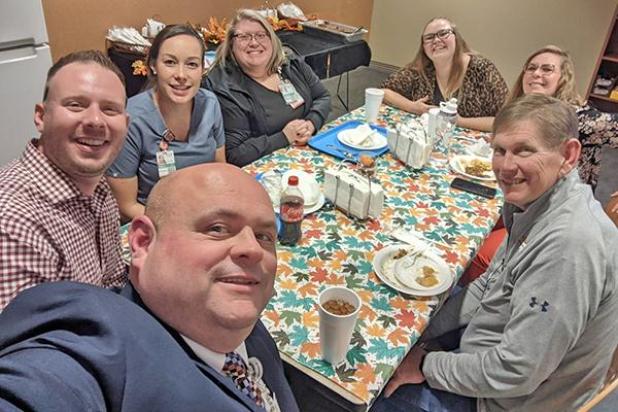
Michael Hassell, right, the new CEO for Melissa Memorial Hospital, chats with lab technician Stephanie McKenzie last Tuesday afternoon. He began work at the hospital following his Oct. 18 appointment by its Board of Directors. — Andrew Turck | The Holyoke Enterprise

Michael Hassell takes a selfie with his co-workers during a Melissa Memorial Hospital appreciation lunch. Pictured clockwise from Hassell are Chief Compliance Officer Jimmie Bailey III, Operating Room Manager Elly Bailey, Registered Nurse Amanda Austin, Admissions Workers Brylea and Carrie Waln, and Board President Steve Young. — Courtesy Photo
‘I’m in it for the people’
Before he starts his day at Melissa Memorial Hospital, CEO Michael Hassell likes to traverse its halls and “touch base” with the staff. “More importantly,” he continued, he tries to visit every patient. Some of them are unsure why he is there or too sick to really register his presence, but – when he gets the chance – he loves hearing stories from the old-timers.
“That’s why I’m in this: I’m in it for the people,” he said “I want them to be happy they chose us for their care.”
The hospital appointed Hassell Oct. 18, after narrowing CEO applicants down to the final three. Steve Young, president of the Hospital Board of Directors, said they found multiple high-quality candidates, and Hassell most exemplified an ability to “be good with the public” and further the hospital’s interests.
An effective CEO, Young said, must understand a hospital’s revenue cycle, work well with others, and coordinate with the government regarding Medicare and Medicaid payments. At the moment, he continued, he is allowing Hassell time to get settled.
“A hospital is a very complicated entity,” he said. “There are a whole bunch of things that go into being a CEO.”
Formative years
Born nearly 1,800 miles from Holyoke in Orlando, Florida, Hassell “grew up with Mickey [Mouse]”: He shares his 1971 birthday with the opening of Walt Disney World. His family grew citrus for their livelihood; his father preached as an ordained Southern Baptist.
Hassell’s first career trajectory followed that of an influential high school football coach in his life who happened to work for the Orlando Police Department. When Hassell spotted a pamphlet advertising the job of cadet, he decided to join the department.
“Those were my early, formative years,” he said, “rolling up to homicide scenes at 3 o’clock in the morning...responding to robberies; and sitting in that van with the dark-tinted windows, taking pictures of prostitutes and drug dealers.”
He left the department to open an electrical contracting business, but found the hustle of salesmanship and bookkeeping didn’t suit him. With a hammer and nails, he decided to build his own house. Had he not moved into the healthcare field, Hassell noted, he would have pursued construction.
But then, one day around 2006, his neighbor collapsed while cutting the lawn. From a couple streets down, Hassell didn’t notice anything awry until he saw the flashing lights of an ambulance. Emergency medical technicians arrived on scene and, watching them work, an idea popped into his head.
“I thought, ‘I always wanted to do that. Why didn’t I do that?’” Hassell said. “The next thing you know, I’m back in school.”
Journey to CEO
Beginning as a critical care paramedic in January 2009, Hassell made the jump to “street” paramedic by September the following year. This, he said, turned out to be “the exact opposite” of how one usually moves into the profession, as critical care paramedics are the more highly trained of the two. The experience, he hopes, helped him gain a “bedside perspective” in patient care.
Often pressing to try new roles, Hassell ascended in leadership through management, consulting and administrative positions over the next decade in three separate Florida healthcare organizations. By April 2020, he became deputy incident commander of what was supposed to be a field hospital in South Florida, but turned into a point of liaison between the state, and county health departments and facilities in their fight against the coronavirus pandemic.
“I ran a couple hundred nurses who were taking care of nursing homes – keeping them afloat, really – from Palm Beach all the way down to Key West,” he said. “The whole time, a good friend and mentor was texting me almost every day: ‘Hey, when are you coming to Troy? When are you coming to Troy?’”
For his final stop before Holyoke, Hassell joined on in September 2020 as administrator for Troy Regional Medical Center, a rural hospital located in Troy, Alabama.
“I did that for a couple years,” he said, “My boss’ plans for exiting that organization weren’t the same as my time date for wanting to move up, and so you start looking for opportunities.”
“The more I looked into Melissa Memorial, the more boxes were checked for me.”
Healthcare philosophy
Hassell expressed a deep interest in restoring old houses; when given the chance, he likes to find what works in each structure and build upon it.
“There are just so many good, intrinsic things here,” he said of the hospital. “I think a lot of the building blocks are already here for things that can make us great.”
He pointed out the facility’s “dedicated doctors” who brought with them ideas from other locations; and an operating room manager whom he called “second to none,” adding that he considered the person qualified to “work in any big city."
Colorado Rural Health Center, as stated in the Nov. 23 issue of The Holyoke Enterprise, recognized Melissa Memorial to be one of the top three of 32 critical access hospitals in the state. Three weeks earlier, the Enterprise detailed the hospital’s remote patient monitoring program, the only one of its type in a rural Colorado clinic. Using that system – which allowed healthcare workers to receive updates from patients at home – the hospital managed to reduce emergency room visits by 94 percent.
“That’s cutting edge,” Hassell said of the monitoring system. “That’s not even cutting edge; that’s tip-of-the-spear modern healthcare.”
Through gaining money for the hospital and implementing it into health programs and education, Hassell said, the hospital will balance both its need for profit and patient care.
“The more efficiently we run the hospital and the more resources we can shepherd into the coffers,” he said, “the more we can do for the people.”
Spiritual component
As a child, Hassell said, people would sometimes ask him what he wanted to be when he grew up: He never once chose “hospital administrator.”
“I think healthcare picks people, I don’t think people pick healthcare,” he said, with the caveat that some children may want to become doctors or nurses. “You needed to find your way here...I certainly do believe in a higher power controlling those things for us.”
He served as critical care paramedic in Florida Hospital, now called AdventHealth Orlando. Its motto states, “The Skill to Heal. The Spirit to Care.” Ranked as the No. 1 hospital in Central Florida by “U.S. News & World Report,” the Seventh-day Adventist nonprofit has a goal of bringing “the healing hand of Christ to our communities” through compassionate care and high-quality medical treatment.
“When you walk through their hospitals, they’ve got certain artwork that’s been dedicated to that mission,” Hassell said. “One of them, called ‘Timmy meets Jesus’ or ‘Timmy meets Christ,’ is this picture of a little boy stepping out of a wheelchair he’s been confined to on this earth and he’s reaching out his arms to his savior.
“It’s impossible to work at a place with that kind of [art] and not think about the spiritual component of what we do.”
While belief in a “higher power” is not necessary for the healthcare profession, Hassell said, belief in the “lasting impact” of one’s work is important.
‘Quality product’
Touring the hospital rooms after-hours, Hassell showed off equipment used in physical therapy, mammograms, radiology and lab work. He also conversed with personnel; one lab tech noted blood testing was available on Fridays at a significantly discounted rate.
Their doughnut-shaped Siemens computed tomography machine, he said, uses software to register digital slices of a person’s body, then reassembles them to find anything “out of place,” such as tumors or signs of a stroke. Determining the type of stroke, he added, could be the difference between recovery and death.
On a lighter note, he took in the clean surfaces, curtains and bathroom space surrounding one of the hospital’s 15 inpatient beds.
“If Marriott had a hospital room, it would probably look like this,” he said. “They’re pretty rooms. Even the floors look good.”
According to Hassell, he enjoys wandering the halls of Melissa Memorial. Without going into detail, he added, medical facilities with more money had not been as well maintained.
In the long term, he wants the next person who takes charge of the hospital to inherit a facility as good – if not better – than the one he served.
“Raising kids, you want them to do better than you did, right?” he said. “So I want to see this place grow and be successful.”
While the picture of such a future is unclear to him at present, Hassell does have a subject he wants to emphasize: diabetes outreach. This subject also happens to tie into the balance of profit and patient care.
Most insurance will cover about four visits to the hospital by diabetic patients, he said. By using those visits and getting help from doctors, he continued, the patient will be healthier and – with the insurance revenue – so will the hospital.
“If there’s a community outreach piece I could have, it would be, ‘When you make an appointment, come to your appointment,’” Hassell said. “Make sure you’re visiting when your doctor says you need to because there’s a reason for those things.
“An insurance company would not spend a dollar if they didn’t feel like it was necessary. If they’re qualifying you to do something, you should take advantage.”
Were the hospital unable to serve patients well, Hassell said, he would “rather they go somewhere else.” Fortunately for him, he continued, “everything we offer is a quality product.”
For more information on the hospital, go to melissamemorial.org/.
